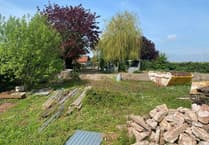PLANS for a solar farm covering nearly 40 hectares of Herefordshire farmland have been thrown out after drawing hundreds of objections.
The 52,000-plus solar panels and other infrastructure were to take up two irregular parcels of land either side of the minor road between the hamlets of Acton Green and Acton Beauchamp, 20 miles north east of Ross.
They would have produced up to 20MW of power, enough to power 6,000 homes, the application Sinton’s End Solar Farm Ltd of east London said, adding it would also “make an important contribution to the continued viability of the farm holding, whilst allowing sheep to graze under the panels.”
But the proposal drew 360 public objections, with issues raised ranging from spoiled views, loss of farmland, impact on wildlife and disruption to local roads and footpaths, to possible flooding from rainwater runoff.
There were also objections from the council’s own highways, drainage, landscape, trees, ecology, building conservation and archaeology officers, mostly citing lack of supporting documentation which would have addressed their concerns.
This was echoed by Acton Beauchamp Group Parish Council, which said a public meeting it held on the bid on September 4 found that “the very large majority” of local residents opposed it.
Its chair David Best then wrote to Herefordshire Council planning officer Rebecca Jenman saying the applicants’ “lack of transparency and engagement leave the council with the impression that the application is not serious, and is in fact being conducted as a ‘fishing expedition’ to assess the strength of opposition… and to test the attitude of the planning department”.
Ms Jenman’s newly published report on the case now says that “by the applicant’s own admission”, the application, minus technical details, was in response to planned reforms to how the national energy network operates, which “requires developers to demonstrate readiness to progress and align with the government’s Clean Power 2030 Action Plan”.
But without “critical” supporting documentation on landscape, drainage, heritage, highways, agricultural land classification, the council “cannot be satisfied that the proposal would avoid or adequately mitigate significant adverse impacts”, she concluded.





Comments
This article has no comments yet. Be the first to leave a comment.